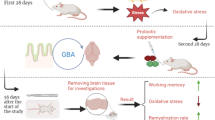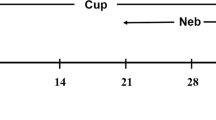Abstract
Multiple sclerosis is an inflammatory demyelinating disease that commences to neuronal cell destruction. Recently, a promising evidence of synergic effects of combined supplementation with vitamin D and probiotics in modulating the gut microbiota and metabolome is emerging. Bacillus Coagulans IBRC-M10791 as a novel strain was chosen, prevention and treatment impacts of regular administered were studied in Cuprizone-induced C57bl/6 mouse of demyelination. The mice were divided into six groups and received a daily dose of cuprizone or probiotics. To investigate the effect of probiotic, the IDO-1, CYP27B1, NLRP1, NLRP3, and AIM2 expression were estimated by Real-Time PCR, and IL-4, IL-17, IFN-gamma, and TGF-beta cytokines were measured by ELISA. The results showed that there was significant decrease in IL-17 and IFN-γ and modulatory effects on IL-4 and TGF-β. On the other hand, we demonstrated that there are significant decrease for expression of IDO-1, CYP27b1, NLRP1, NLRP3 and AIM2 genes in prevention and treatment groups compared to cuprizone group. Also, a significant enhancement in rate of remyelination and alternations proved by LFB staining and Y-Maze test. In conclusion, our study provides insight into how the therapeutic effect of the chosen strain of probiotic was correlated with the modulation of the level of inflammatory and anti-inflammatory cytokines. Further, we demonstrated that the expression of genes related to Tryptophan, Vitamin D and Inflammasome pathways could be affected by B.coagulans. Our study could be beneficial to provide a novel Co-therapeutic strategy for Multiple sclerosis.






Similar content being viewed by others
References
Abboud M, Rizk R, AlAnouti F et al (2021) The health effects of vitamin D and probiotic co-supplementation: a systematic review of randomized controlled trials. Nutrients 13:111
Bar-Or A, Rieckmann P, Traboulsee A, Yong VW (2011) Targeting progressive Neuroaxonal injury. CNS Drugs 25:783–799
Becher B, Giacomini PS, Pelletier D et al (1999) Interferon-γ secretion by peripheral blood T-cell subsets in multiple sclerosis: correlation with disease phase and interferon-β therapy. Ann Neurol Off J Am Neurol Assoc Child Neurol Soc 45:247–250
Beck J, Rondot P, Catinot L et al (1988) Increased production of interferon gamma and tumor necrosis factor precedes clinical manifestation in multiple sclerosis: do cytokines trigger off exacerbations? Acta Neurol Scand 78:318–323
Belkaid Y, Hand TW (2014) Role of the microbiota in immunity and inflammation. Cell 157:121–141
Benton D, Williams C, Brown A (2007) Impact of consuming a milk drink containing a probiotic on mood and cognition. Eur J Clin Nutr 61:355–361
Bermudez-Brito M, Plaza-Díaz J, Muñoz-Quezada S et al (2012) Probiotic mechanisms of action. Ann Nutr Metab 61:160–174
Cosorich I, Dalla-Costa G, Sorini C et al (2017) High frequency of intestinal TH17 cells correlates with microbiota alterations and disease activity in multiple sclerosis. Sci Adv 3:e1700492
Dargahi N, Johnson J, Donkor O et al (2018) Immunomodulatory effects of Streptococcus thermophilus on U937 monocyte cell cultures. J Funct Foods 49:241–249. https://doi.org/10.1016/j.jff.2018.08.038
Digehsara SG, Esfandiari B, Karim E et al (2021) Effects of Lactobacillus casei strain T2 (IBRC-M10783) on the modulation of Th17/Treg and evaluation of miR-155, miR-25, and IDO-1 expression in a Cuprizone-induced C57BL/6 mouse model of demyelination. Inflammation 44:334–343
Duhen R, Glatigny S, Arbelaez C et al (2013) Pathogenicity of IFN-γ+ Th17 cells is independent of T-bet (P4128)
Eckburg PB, Bik EM, Bernstein CN et al (2005) Diversity of the human intestinal microbial flora. Science (80- ) 308:1635–1638
Gombart AF (2009) The vitamin D–antimicrobial peptide pathway and its role in protection against infection. Future Microbiol 4:1151–1165
Goodin DS (2016) The epidemiology of multiple sclerosis: insights to a causal cascade. Handb Clin Neurol 138:173–206
Govindarajan V, de Rivero Vaccari JP, Keane RW (2020) Role of inflammasomes in multiple sclerosis and their potential as therapeutic targets. J Neuroinflammation 17:1–15
He B, Hoang TK, Tian X et al (2019) Lactobacillus reuteri reduces the severity of experimental autoimmune encephalomyelitis in mice by modulating gut microbiota. Front Immunol 10:385
Ho S-T, Hsieh Y-T, Wang S-Y, Chen M-J (2019) Improving effect of a probiotic mixture on memory and learning abilities in d-galactose–treated aging mice. J Dairy Sci 102:1901–1909
Høglund RA, Maghazachi AA (2014) Multiple sclerosis and the role of immune cells. World J Exp Med 4:27
Hughes RL (2020) A review of the role of the gut microbiome in personalized sports nutrition. Front Nutr 6:191
Jensen GS, Benson KF, Carter SG, Endres JR (2010) GanedenBC 30™ cell wall and metabolites: anti-inflammatory and immune modulating effects in vitro. BMC Immunol 11:1–14
Kelleher P, Goodsall A, Mulgirigama A et al (2006) Interferon-γ therapy in two patients with progressive chronic pulmonary aspergillosis. Eur Respir J 27:1307–1310
Kirby TO, Ochoa-Repáraz J (2018) The gut microbiome in multiple sclerosis: a potential therapeutic avenue. Med Sci 6:69
Kobayashi T, Suzuki T, Kaji R et al (2012) Probiotic upregulation of peripheral IL-17 responses does not exacerbate neurological symptoms in experimental autoimmune encephalomyelitis mouse models. Immunopharmacol Immunotoxicol 34:423–433
König J, Wells J, Cani PD et al (2016) Human intestinal barrier function in health and disease. Clin Transl Gastroenterol 7:e196
Konuray G, Erginkaya Z (2018) Potential use of Bacillus coagulans in the food industry. Foods 7:92
Langdon A, Crook N, Dantas G (2016) The effects of antibiotics on the microbiome throughout development and alternative approaches for therapeutic modulation. Genome Med 8:39. https://doi.org/10.1186/s13073-016-0294-z
Lee PW, Severin ME, Lovett-Racke AE (2017) TGF-β regulation of encephalitogenic and regulatory T cells in multiple sclerosis. Eur J Immunol 47:446–453
Lee YK, Mazmanian SK (2010) Has the microbiota played a critical role in the evolution of the adaptive immune system? Science (80- ) 330:1768–1773
Lovelace MD, Varney B, Sundaram G et al (2016) Current evidence for a role of the kynurenine pathway of tryptophan metabolism in multiple sclerosis. Front Immunol 7
Jones MR, Mercante WJ, Neish SA (2012) Reactive oxygen production induced by the gut microbiota: pharmacotherapeutic implications. Curr Med Chem 19:1519–1529
Mancuso R, Hernis A, Agostini S et al (2015) Indoleamine 2, 3 dioxygenase (IDO) expression and activity in relapsing-remitting multiple sclerosis. PLoS One 10:e0130715
McMurran CE (2018) CNS Remyelination and the gut microbiota
Mittal M, Siddiqui MR, Tran K et al (2014) Reactive oxygen species in inflammation and tissue injury. Antioxid Redox Signal 20:1126–1167
Oelschlaeger TA (2010) Mechanisms of probiotic actions–a review. Int J Med Microbiol 300:57–62
Olcum M, Tastan B, Kiser C et al (2020) Microglial NLRP3 inflammasome activation in multiple sclerosis. Adv Protein Chem Struct Biol 119:247–308
Ortiz AM, Klase ZA, DiNapoli SR et al (2016) IL-21 and probiotic therapy improve Th17 frequencies, microbial translocation, and microbiome in ARV-treated, SIV-infected macaques. Mucosal Immunol 9:458–467. https://doi.org/10.1038/mi.2015.75
Ostadmohammadi V, Jamilian M, Bahmani F, Asemi Z (2019) Vitamin D and probiotic co-supplementation affects mental health, hormonal, inflammatory and oxidative stress parameters in women with polycystic ovary syndrome. J Ovarian Res 12:1–8
Owaga E, Hsieh R-H, Mugendi B et al (2015) Th17 cells as potential probiotic therapeutic targets in inflammatory bowel diseases. Int J Mol Sci 16:20841–20858. https://doi.org/10.3390/ijms160920841
Riazi S, Wirawan RE, Badmaev V, Chikindas ML (2009) Characterization of lactosporin, a novel antimicrobial protein produced by Bacillus coagulans ATCC 7050. J Appl Microbiol 106:1370–1377
Rosenblum MD, Remedios KA, Abbas AK (2015) Mechanisms of human autoimmunity. J Clin Invest 125:2228–2233. https://doi.org/10.1172/JCI78088
Salehipour Z, Haghmorad D, Sankian M et al (2017) Bifidobacterium animalis in combination with human origin of Lactobacillus plantarum ameliorate neuroinflammation in experimental model of multiple sclerosis by altering CD4+ T cell subset balance. Biomed Pharmacother 95:1535–1548
Schattling B, Eggert B, Friese MA (2014) Acquired channelopathies as contributors to development and progression of multiple sclerosis. Exp Neurol 262:28–36
Secher T, Kassem S, Benamar M et al (2017) Oral administration of the probiotic strain Escherichia coli Nissle 1917 reduces susceptibility to Neuroinflammation and repairs experimental autoimmune encephalomyelitis-induced intestinal barrier dysfunction. Front Immunol. 2017; 8: 1096
Singh A, Sarangi AN, Goel A et al (2018) Effect of administration of a probiotic preparation on gut microbiota and immune response in healthy women in India: an open-label, single-arm pilot study. BMC Gastroenterol 18:85. https://doi.org/10.1186/s12876-018-0819-6
Sintzel MB, Rametta M, Reder AT (2018) Vitamin D and multiple sclerosis: a comprehensive review. Neurol Ther 7:59–85
Smolders J, Schuurman KG, van Strien ME et al (2013) Expression of vitamin D receptor and metabolizing enzymes in multiple sclerosis—affected brain tissue. J Neuropathol Exp Neurol 72:91–105
Tanabe S (2013) The effect of probiotics and gut microbiota on Th17 cells. Int Rev Immunol 32:511–525. https://doi.org/10.3109/08830185.2013.839665
Tesmer LA, Lundy SK, Sarkar S, Fox DA (2008) Th17 cells in human disease. Immunol Rev 223:87–113. https://doi.org/10.1111/j.1600-065X.2008.00628.x
Usami M, Miyoshi M, Yamashita H (2015) Gut microbiota and host metabolism in liver cirrhosis. World J Gastroenterol 21:11597
Vujkovic-Cvijin I, Swainson LA, Chu SN et al (2015) Gut-resident Lactobacillus abundance associates with IDO1 inhibition and Th17 dynamics in SIV-infected macaques. Cell Rep 13:1589–1597. https://doi.org/10.1016/j.celrep.2015.10.026
Wetzel LA, Hurtado M, Kaswan ZAM et al (2020) Deletion of indoleamine 2, 3 dioxygenase (Ido) 1 but not Ido2 exacerbates disease symptoms of MOG35-55-induced experimental autoimmune encephalomyelitis. Brain, Behav Immunity-Health 7:100116
Wu H-J, Wu E (2012) The role of gut microbiota in immune homeostasis and autoimmunity. Gut Microbes 3:4–14
Yan F, Polk DB (2011) Probiotics and immune health. Curr Opin Gastroenterol 27:496
Yu X, Yu M, Liu Y, Yu S (2016) TRP channel functions in the gastrointestinal tract. In: Seminars in immunopathology. Springer, pp. 385–396
Zhen W, Liu A, Lu J et al (2017) An alternative cuprizone-induced demyelination and remyelination mouse model. ASN Neuro 9:1759091417725174
Ziemssen T, Ziemssen F (2005) The role of the humoral immune system in multiple sclerosis (MS) and its animal model experimental autoimmune encephalomyelitis (EAE). Autoimmun Rev 4:460–467
Acknowledgements
No acknowledgements.
Availability of data and material
Data and material provide a standardised format.
Funding
No funding was received for conducting this study.
Author information
Authors and Affiliations
Contributions
All authors equally contribute in preparation of this manuscript.
Corresponding author
Ethics declarations
Conflict of interest
The authors declare that they have no conflict of interest.
Ethical approval and consent to participate
All applicable international, national, and/or institutional guidelines for the care and use of animals were followed by the authors.
Consent for publication
All authors consent for publication.
Additional information
Publisher’s note
Springer Nature remains neutral with regard to jurisdictional claims in published maps and institutional affiliations.
Rights and permissions
About this article
Cite this article
Sadeghirashed, S., Kazemi, F., Taheri, S. et al. A novel probiotic strain exerts therapeutic effects on mouse model of multiple sclerosis by altering the expression of inflammasome and IDO genes and modulation of T helper cytokine profile. Metab Brain Dis 37, 197–207 (2022). https://doi.org/10.1007/s11011-021-00857-7
Received:
Accepted:
Published:
Issue Date:
DOI: https://doi.org/10.1007/s11011-021-00857-7




